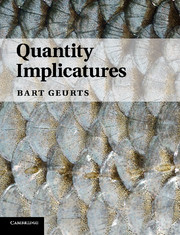Book contents
- Frontmatter
- Contents
- Preface
- Introduction
- 1 Gricean pragmatics
- 2 The Standard Recipe for Q-implicatures
- 3 Scalar implicatures
- 4 Psychological plausibility
- 5 Nonce inferences or defaults?
- 6 Intentions, alternatives, and free choice
- 7 Embedded implicatures: the problems
- 8 Embedded implicatures: a Gricean approach
- Afterword
- Notation and abbreviations
- References
- Index
4 - Psychological plausibility
Published online by Cambridge University Press: 04 February 2011
- Frontmatter
- Contents
- Preface
- Introduction
- 1 Gricean pragmatics
- 2 The Standard Recipe for Q-implicatures
- 3 Scalar implicatures
- 4 Psychological plausibility
- 5 Nonce inferences or defaults?
- 6 Intentions, alternatives, and free choice
- 7 Embedded implicatures: the problems
- 8 Embedded implicatures: a Gricean approach
- Afterword
- Notation and abbreviations
- References
- Index
Summary
For Grice, conversational implicature is a chapter in what he calls “philosophical psychology”. I will not attempt to define what he means by this, but it is obvious enough that Grice's theory is deeply imbued with such psychological notions as belief, intention, and so forth. It is somewhat remarkable, therefore, that the Gricean framework is often claimed not to be a psychological one, or not to make “psychological predictions”. In a sense, this is true. When taken on its own, Grice's general theory of conversational implicature makes no predictions about what will be observed in everyday life or in the psychology lab, and the Gricean theory of Q-implicatures outlined in the foregoing is in the same boat. For example, though we predict that, under such-and-such circumstances, an utterance of sentence φ will have ψ as an implicature, this does not entail that, under said circumstances, hearers will interpret φ as implying ψ. A Gricean theory of implicature is about inferences hearers are entitled to make, not about the inferences they will make.
Nevertheless, it is a mistake to write off the Gricean approach as an idle exercise in philosophy devoid of any bearing on “real” psychology whatsoever. For, given its distinctively psychologistic signature, it is only a small step from a Gricean theory of pragmatics to a theory of experimental pragmatics. All it takes is minimal auxiliary assumptions like the following, for instance:
i. If, according to the Gricean theory, φ implicates that ψ, then hearers will tend to derive ψ as an implicature.
- Type
- Chapter
- Information
- Quantity Implicatures , pp. 67 - 82Publisher: Cambridge University PressPrint publication year: 2010



